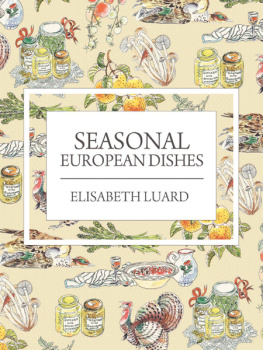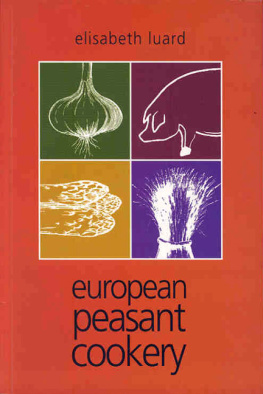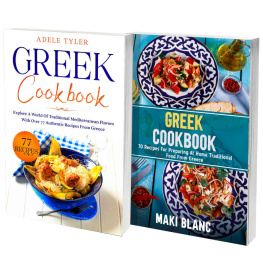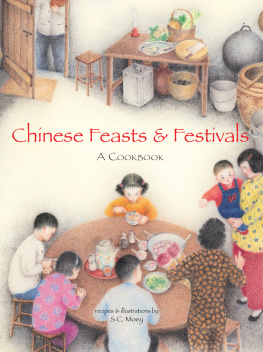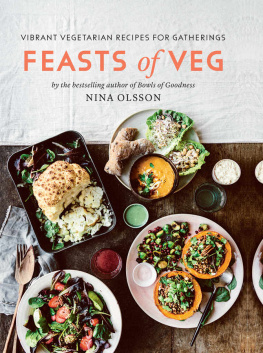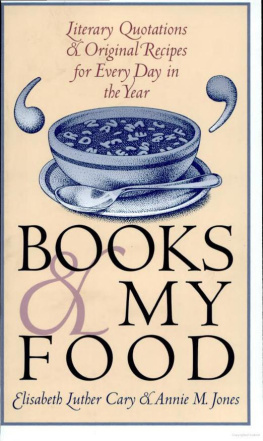This paperback edition published in 2013
by Grub Street
4 Rainham Close
London SW11 6SS
Email:
www.grubstreet.co.uk
Text copyright Elisabeth Luard 1990, 2013
Copyright this edition Grub Street 2013
Cover design by Sarah Driver
Formatting by Sarah Driver
General index by Douglas Matthews
Recipe index by Amy Davies Dolamore
This book was previously published under the title European Festival Food
The right of Elisabeth Luard to be identified as author of this work has been asserted in accordance with sections
77 and 78 of the Copyright Designs and Patents Act 1988.
A CIP record for this book is available from the British Library
ISBN 978-1908117-43-4
EPUB ISBN: 978-1909808-69-0
All rights reserved. No part of this publication may be reproduced, stored in a retrieval system, or transmitted in
any form or by any means, electronic, mechanical, photocopying, recording, or otherwise, without the prior permission
of the publishers
ACKNOWLEDGEMENTS
I am greatly indebted to many people for assistance with this book, both those mentioned in the text and those who have helped me in my research. This last includes the courteous staff of the London Library (my private university); and particularly the Librarian at the time of writing, Douglas Matthews. Practical assistance with recipe testing came from Priscilla White, Chrissie MacDonald and Venetia Parkes: patient fryers of fritters, uncomplaining stuffers of chickens. And to my good friend and much-valued editor and publisher Anne Dolamore of Grub Street for returning this book to print.
This new edition is dedicated to the memory of my beloved daughter Francesca, who dearly loved a party.
Authors note
Quantities are given in both imperial and metric measurements. Please use only one or other throughout a recipe.
Metric equivalents occasionally differ between recipes, particularly in baking: for example, 4oz may in one case be
given as 100g and in another 125g. This occurs in order to keep proportions of ingredients correct, and when
using a recipe you should follow the amounts as given.
CONTENTS
Introduction
This book began with the games of children, the last refuge of ancient custom.
For those of us who grew up in post-war Europe, it seemed that the thread of understanding which linked us to the rhythms of the past was abruptly, violently severed. The war altered for ever the pattern of Europes daily life including the way we chose to celebrate our holidays. The old celebrations of the changing year, and the necessary tributes to the powers who controlled it, came to an end. They were no longer relevant to the new, urbanized, seasonless pattern of our lives. Such festivities as we retain have increasingly become municipal events. Our feasts, once orgies of eating and merrymaking to compensate for times of hardship, are nowadays altogether more decorous and orderly affairs.
The changes are entirely suitable for the responsible law-abiding citizens we have become in our historical maturity. Children, however, are less easily diverted from their natural rhythms. They delight in ritual and ceremony. But they also natural disciples of the outlaw gods of Greece and the topsy-turvy mirror world of the Celts love nonsense and disorder. Deprived of the old festivals, children demand new ones.
As my own young ones grew, they clamoured for special feasts to mark rites of passage and I found myself with only a faint understanding of what form such celebrations should take. The little I did know seemed woefully inadequate, a mere twig floating on an ocean of possibilities. How were we, a new postwar urban family, to organize a christening feast? What, and above all why, were the rituals proper for Christmas, Easter, May Day, Halloween? It may be true, as Jung suggested, that ancestral memory forms part of the collective unconscious but my individual unconscious was of little assistance when under pressure from four small children to produce an appropriate feast at the drop of the conjurers hat. Memory needed more than a little jog: mine had to re-learn the whole vocabulary.
At first we invented our own traditions. No sooner was the ritual performed than it was enshrined in custom. Birthdays acquired a seasonal slant: with six of us to mark the passage of years, we averaged a feast-day every two months. A high concentration of winter birthdays meant that chocolate cake, bonfires and toasting-forks outnumbered the picnics and strawberries of summer.
Later, when we lived for many years deep in rural Spain, we acquired a taste for these rhythms and needed to mark the seasonal feasts: the stripping of the cork-trees which surrounded our house, the gathering of the chestnut harvest, the annual pig-killing. So we shared the dishes which our neighbours thought proper for the occasion. As our lives were peripatetic, we soon began to celebrate the major church festivals according to the practice of whoever we found ourselves among. Neighbours caught up in the general festive spirit were happy to advise us deplorably ignorant visitors on the proper conduct of, say, the fasting supper of the Provenal Christmas Eve, and, naturally, on the disposition and significance of the thirteen desserts which followed the midnight Mass and pastorale. In Andalucian Spain, we were swept up bodily in the glorious open-air picnics of the Whitsun pilgrimages. Later we were made welcome guests for the cracking of red eggs and the roast lamb which concludes the candlelit vigil of a Greek island Easter.
Long though it is, the shortcomings of this book are many. I have not attempted to delineate all the customs and ceremonies, the feasts and the festivals, which enlivened the passing seasons in our grandparents time, and of their grandparents before them. No doubt I have failed to mention your own favourite festival, not included your own special feast-day dish omissions which, in the spirit of the celebration, you will have to forgive. If you remember them, they must still be alive and real and will no doubt remain so.
Nor have I included the Jewish festivals, except to acknowledge the massive and obvious debt that the rituals of Christianity owe to the great temples of Jerusalem and Antioch. To have attempted that would indeed have made the book completely unmanageable.
As for the geographic and cultural scope of the book, there are no easy divisions to be drawn. Europes frontiers have drifted back and forth throughout her history. As far as possible, particularly with the major festivals, I have tried to work within the limits, give or take wide margins, of four spheres of culture: the old area of influence of the Ottoman Turks in the East; the ancient Celtic strongholds in the West; in the South those provinces which came most strongly under the rule of the Romans, with acknowledgement to the Moors who followed them; and in the North the predominantly Germanic culture which embraces, although it by no means engulfs, Scandinavia. Nonetheless, every country, village and family is a law unto itself. There are no rules in this fluid anarchic tradition which governs our festivals. All edges are blurred: it is indeed a wise child who knows its own father.
Our horizons are not limited by the old restraints of time and distance, and the need to sow corn, pasture cattle, trawl seas, or gather harvest. Such matters are no longer our daily bread. That is earned in other ways, and we have new playthings in our toy-cupboard, more manageable monsters to fill our dreams. Celluloid ghouls have replaced the man-wolf who once patrolled the Mediterranean forests. Small-screen romance has routed the dancing fauns of May. The seasons are reduced to the inconvenience of rain on city pavements: the thunder-god who rode the northern storms now shares his skies with transoceanic jets.
Next page
